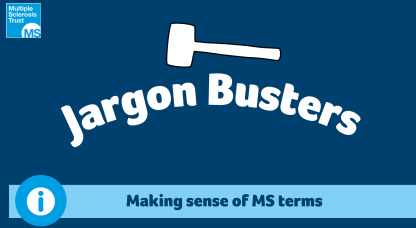Miranda Olding is a clinical nurse specialist in MS, working in Bedfordshire.
Ask the expert: MS relapses
1 October 2023
How is a relapse defined?
Miranda says: A relapse is defined by new symptoms or the sudden occurrence of symptoms that you’ve had before – but not for the past 30 days – that last for at least 24 hours and are not being caused by an underlying infection, by heat or by becoming incredibly tired. Relapses often last a lot longer than 24 hours. The symptoms must also be associated with MS, so if you suddenly develop knee pain or nausea and vomiting, then that’s not going to be a relapse. But you may need to ask!
What’s happening in my body when I have a relapse?
Miranda says: There are immune cells circulating within our blood which are not supposed to cross the blood-brain barrier. This is a really thin layer of tightly packed cells which prevents other cells passing from the blood stream into your brain and spinal cord (the central nervous system). However for reasons we don’t understand, in MS those immune cells cross from the blood into your central nervous system.
Once they’re there, the immune cells become confused and recognise the covering around your nerves (myelin) as a pathogen, or an invader, something which is alien, and seek to destroy it. The result is that when the myelin has been damaged, the signal or message can’t travel down the nerve in the way that it should. It’s either slowed down or completely stopped from passing, and then you get symptoms in various parts of the body because the nerves can’t transmit their information. This is the process that’s happening in your body when you have a relapse.
Can all relapses be seen on an MRI scan?
Miranda says: Ideally a relapse – an inflammatory, demyelinating episode in the central nervous system – should be able to be picked up on an MRI scan. However we know that up to 40% can be missed. They can be missed because the scanners aren’t powerful enough, as scanners vary in their power and effectiveness. Also, you can have clinical symptoms from an incredibly small lesion and those tiny lesions aren’t necessarily picked up by MRI scanners.
The other problem is that you don’t necessarily get your scan immediately when you’re having a relapse. Lesions can actually heal up. In the relapsing remitting stages of MS, your body re-myelinates which means it’s creating more myelin and repairing the damage. The bright spots only show up on MRI scans when the nerves are in a damaged state, so if you end up having an MRI scan three months after the event it may well not show up.
How can I manage my anxiety about having a relapse in the future?
Miranda says: I think it’s about making sure that you’ve understood how to identify a relapse and you know that whenever you’re worried that you might be having a relapse you can get in touch with your MS team.
If you have people around you who are supportive, talk with them and explain that because you have MS it’s possible you may have a relapse in the future and that you may need some more support from them during that time.
If you’ve got young children and you have a relapse, that may be a time when you really need to call on your friends and family for help because your children’s demands won’t stop. If you’re living without young children, you may be able to take time off work and focus on looking after yourself at home with the support of your MS team.
Have discussions with your friends and family. Think about who you could call on. What would you do if you had a relapse? Maybe even write down an action plan. If you realise you might not have enough support in place, then talk to your MS nurse and work with them to come up with a plan.
Do everything in your power to address the MS. Make sure you’re on the most appropriate disease modifying drug. If you are on a disease modifying drug but you’re still having relapses, have a discussion with your neurologist and MS nurse about whether it is time to switch up. Do you need a more effective treatment? Also, make sure you address your lifestyle too. Are you making healthy choices when it comes to diet and exercise?
Then, once you’ve done all this planning, try not to worry. There was a flow chart diagram I saw that said “Is there something to worry about?” >>“Yes” >>“Is there something I can do about it?” >> “Yes” >> “Have I done those things?” >> “Yes” >>“Then don’t worry!” I think these are good steps to follow when it comes to overcoming the anxiety of having a relapse in the future.
Can I exercise whilst recovering from a relapse or will this do more damage?
Miranda says: There isn’t any evidence that’s been published about exercise in relapses in MS. We do know that on the whole in MS exercise is beneficial at reducing fatigue and is an absolute, 100% “yes” in general. My personal advice to people I see in clinic is when you’re actually having a relapse, just absolutely chill out, take care of yourself and rest. If you’re going to have any exercise, just make it very gentle – a little walk in the fresh air, maybe when you’re recovering a bit more, a very gentle swim or a gentle exercise class. But don’t push it or do anything which raises your core body temperature and increases fatigue because then you’re likely to struggle with the symptoms of the
relapse again.
How can you tell the difference between a relapse and day-to-day symptom fluctuations?
Miranda says: It can be a grey area. A relapse would either be new symptoms or it would be old symptoms coming back which come on without being caused by infection or getting overheated; last at least 24 hours and may escalate. Generally, we would be expecting the symptoms to have some kind of impact on your everyday functioning. If you are worse, number one, always check for infection.
However, it’s very common in MS to have a lot of ups and downs, good days and bad days, and that can be closely related to how fatigued you are.
These symptom fluctuations can also be a result of previous relapses where your body hasn’t been able to fully recover. When your body re-myelinates after a relapse, the repaired myelin is not quite as strong as the original covering of myelin. This means the repaired myelin can be more likely to short circuit under stress. For example, it might be that you get a numb right foot when you’re really tired, when you have a hot bath, or when you’ve had a workout. That’s just because that area is an area which struggles when you struggle. That’s not a relapse. If you can have a good night’s sleep and then you wake up in the morning and you’re okay again, that’s not a relapse.
Similarly, a lot of people with MS have some symptoms which they have to deal with on an everyday basis which are always a problem. If something’s pretty much always a problem, although you might have some days where you feel surprisingly good, when that plays up, that’s not a relapse either.
A relapse, on the other hand, is a kind of sudden event, or it might be an event that starts and then escalates and gets worse, maybe over a couple of weeks, and then plateaus off before gradually starting to get better.
Latest news & stories
Sign up to updates from us
Keep up-to-date with the latest MS news, explore new research, read the stories of people living with MS, find out practical tips from MS experts, and discover exciting fundraising opportunities
If you would like to sign up for post or telephone (SMS) updates you can complete our sign up form here





